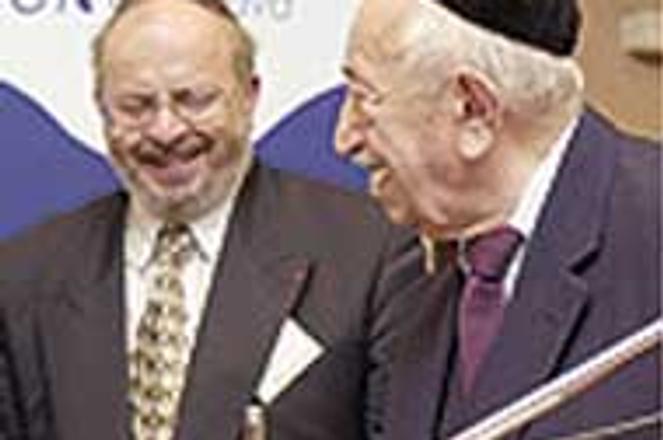Simon Wiesenthal (right), the famed Nazi hunter, greets colleagues at a March 12-15 conference of European rabbis in Bratislava.photo: TASR
Metal detectors and masked police gunmen on the roof of Bratislava's Hotel Danube greeted rabbis on March 12 for the start of their 22nd bi-annual European conference. The biggest Jewish conference in Slovakia since the 1930s was under tight security because of the planned March 14 demonstrations by Slovak skinheads to honour the establishment of the first Slovak state.
Originally scheduled for Vienna, the March 12-15 conference was moved to Slovakia in February in protest of Austria's inclusion of Jörg Haider's nationalist Freedom Party in the government coalition. But the nationalist rallies outside were a stark reminder that Slovakia too still had far-right fanatics to deal with .
"Slovak Nazis were responsible for the deaths of Slovak Jews during WWII," said 91-year-old Simon Wiesenthal, founder of a Vienna-based Nazi-crime documentation centre which has brought about the imprisonment of over 1,000 Nazi criminals. "During the [Slovakia's wartime President Jozef] Tiso regime, more than 70,000 Jews were deported from Slovakia to concentration camps in Poland and Germany."
Part of an effort to prevent future tragedies such as the Holocaust, the rabbis' convention in the Slovak capital was focused in part on what they said was the rising tide of nationalist sentiment in several European countries.
"Part of our agenda is to call on European governments to check the rise of right-wing nationalist parties in Europe, such as Haider's," said Councillor Aba M. Dunner, the Conference's Secretary General. "It's been only 50 years since the war, and the fact that these people can organise themselves with such a nationalist stance is frightening."
Slovak President Rudolf Schuster and Prime Minister Mikuláš Dzurinda both attended the convention reception March 13, where they told the rabbis that Slovakia was trying to build a civil society in which every person would feel welcome regardless of race or religion. "We are very happy that we can have you here," Dzurinda said in his welcoming speech. "We want everybody to feel confident about coming to our country."
In spite of the pro-Tiso demonstrations outside, the rabbis said they felt safe in the Slovak capital and appreciated the police protection. "We wrote a letter to Interior Minister [Ladislav Pittner] asking for protection, but we did not expect such big measures," said Baruch Myers, chief rabbi of the Bratislava Jewish community, which numbers some 500 strong.
"As an American, I respect people's right to assemble, but I don't think that the tragic period of the Slovak wartime state should be celebrated," Myers added. "People were asking me if I thought it was appropriate to meet at the time of the skinhead rally at Hodžovo námestie, and I said 'Yes, I think it's very appropriate.' Why should we change our plans because of what they are doing?"
Slovak Police Presidium Spokesman Jaroslav Sahul said that the forces of armed guards would be ready to handle any problems. "We expect March 14 to be the critical day," he said. "But we're well-prepared. This is probably the biggest police mobilisation we have ever taken."
To assure the rabbis' safety, Hotel Danube Director Serge Yu said that his hotel had worked closely with the 350 policemen keeping guard. "We did everything the police asked of us to ensure their safety," he said. Police even escorted rabbis on walks through the city.
With the question of their safety answered by the heavy security outside, the rabbis were free to get down to business. They talked about the restitution of confiscated Jewish property, artwork and other precious family jewels taken during the war, and discussed "internal religious issues" such as the role of women in Judaism, and the religious education of young Jews.
"Our parents were just happy to survive the camps - that's why they weren't so active in gaining restitution of their property," said Dunner. "So we want to help do something about the lost family houses or illuminated Jewish books, for example, which may now be lying forgotten somewhere in an American library."
As a way of preserving the Jewish nation, the rabbis also discussed possibilities for the developed western communities to help "establish" eastern and central European communities. "We have to help these communities because they can help the religion survive," said Dunner.
Another means of nurturing Judaism's sustained vitality is through the education of the younger Jewish community members. "We discussed the issues of youth in Judaism." Myers said. "We spoke of Jewish education and keeping the tradition alive by raising our children in the traditional atmosphere."
Altogether, participants felt safe and comfortable at the Bratislava conference. For the Jewish community, the welcome mat laid out for the rabbis' conference was a sign of Slovakia's ever-increasing democratic nature. "Here we are, almost 200 rabbis from Glasgow to Vladivostok [in eastern Russia], showing our unity and faith in your [Slovak] democracy, and your effort to re-build a free-society," said Ygal Abibi, Secretary of the Religion Minister of Israel.
Because of Bratislava's rich Jewish history - Bratislava is home to the tomb of Rabbi Khatham Sopher, a site which Abibi said was "one of the holiest of Jewish sites" - Dunner added that the rabbis had discussed the possibility of Bratislava eventually becoming a major Jewish tourist venue.


